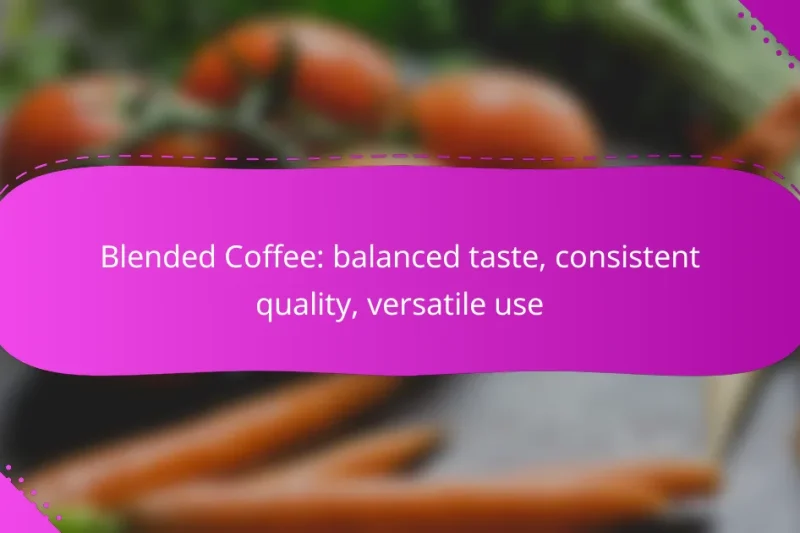Espresso coffee is celebrated for its intense flavor and concentrated brew, delivering a rich and satisfying … Espresso Coffee: intense flavor, concentrated brew, rich cremaRead more
Coffee is a beloved beverage enjoyed worldwide, with a rich diversity of varieties that cater to different tastes and preferences. From the popular Arabica and Robusta to emerging specialty options, each type offers unique flavors and health benefits. Understanding the characteristics of various coffee varieties can enhance your brewing experience and help you select the perfect cup for your palate.
Cold Brew Coffee: steeping method, slow extraction, low acidity
Cold brew coffee is a unique brewing method that involves steeping coarsely ground coffee in cold … Cold Brew Coffee: steeping method, slow extraction, low acidityRead more
Decaf Coffee: caffeine-free, smooth finish, retains flavor
Decaf coffee offers a delightful alternative for those seeking to enjoy rich coffee flavors without the … Decaf Coffee: caffeine-free, smooth finish, retains flavorRead more
Dark Roast Coffee: production costs, popular demand, wide availability
Dark roast coffee has become increasingly popular in New Zealand, driven by a consumer preference for … Dark Roast Coffee: production costs, popular demand, wide availabilityRead more
Siphon Coffee: theatrical brewing, vacuum method, unique flavor
Siphon coffee brewing employs a vacuum method that transforms the coffee-making process into a captivating theatrical … Siphon Coffee: theatrical brewing, vacuum method, unique flavorRead more
Flavored Coffee: added ingredients, diverse pricing, seasonal trends
Flavored coffee has become a beloved choice for many, offering a delightful range of options from … Flavored Coffee: added ingredients, diverse pricing, seasonal trendsRead more
Blended Coffee: balanced taste, consistent quality, versatile use
Blended coffee is celebrated for its balanced taste and consistent quality, achieved by combining beans from … Blended Coffee: balanced taste, consistent quality, versatile useRead more
Moka Pot Coffee: stovetop brewing, strong flavor, espresso-like
Moka Pot coffee is a popular stovetop brewing method that delivers a robust, espresso-like flavor. By … Moka Pot Coffee: stovetop brewing, strong flavor, espresso-likeRead more
Specialty Coffee: high quality, unique processing, expert sourcing
Specialty coffee represents the pinnacle of quality, characterized by meticulously sourced beans and innovative processing techniques … Specialty Coffee: high quality, unique processing, expert sourcingRead more
Nitro Coffee: creamy texture, cold served, unique presentation
Nitro coffee is a delightful beverage that combines cold brew coffee with nitrogen gas, resulting in … Nitro Coffee: creamy texture, cold served, unique presentationRead more
What are the best coffee varieties available in New Zealand?
New Zealand offers a diverse selection of coffee varieties, with Arabica and Robusta being the most popular. Specialty coffee options are also gaining traction, appealing to discerning coffee enthusiasts.
Arabica coffee
Arabica coffee is known for its smooth, mild flavor and aromatic qualities, making it a favorite among coffee drinkers. In New Zealand, Arabica beans are often sourced from regions like Central and South America, as well as Africa, where the climate is ideal for growing high-quality beans.
This variety typically has a lower caffeine content compared to others, which can enhance the tasting experience. When selecting Arabica coffee, look for beans with a rich aroma and a balanced acidity for the best flavor profile.
Robusta coffee
Robusta coffee is characterized by its strong, bold flavor and higher caffeine content, which gives it a more bitter taste. This variety is often used in espresso blends and instant coffee due to its robust nature and crema-producing qualities.
In New Zealand, Robusta is less common than Arabica but can be found in some blends. When purchasing Robusta, consider its origin, as beans from different regions can vary significantly in flavor and quality.
Liberica coffee
Liberica coffee is less well-known but offers a unique flavor profile with floral and fruity notes. This variety is primarily grown in West Africa and Southeast Asia, and it has a distinct aroma that sets it apart from Arabica and Robusta.
While not widely available in New Zealand, those seeking a different coffee experience may find Liberica at specialty coffee shops or online retailers. Its unconventional taste can be an exciting option for adventurous coffee drinkers.
Excelsa coffee
Excelsa coffee is a rare variety that is often used to add complexity to blends. It has a unique flavor profile that combines fruity and tart notes, making it a distinctive choice for coffee lovers.
Though not commonly found in New Zealand, Excelsa can sometimes be sourced from specialty coffee roasters. If you encounter it, consider trying it as a single-origin brew to fully appreciate its unique characteristics.
Specialty coffee options
Specialty coffee options in New Zealand include single-origin beans, unique blends, and artisanal roasting techniques. Many local roasters focus on sourcing high-quality beans and emphasizing sustainable practices.
When exploring specialty coffee, look for certifications such as Fair Trade or Rainforest Alliance, which indicate ethical sourcing. Visiting local cafes and roasteries can provide opportunities to taste various offerings and learn more about the coffee-making process.
How to choose the right coffee variety for your taste?
Choosing the right coffee variety involves understanding your flavor preferences, brewing methods, and the characteristics of coffee from different origins. Start by considering what flavors you enjoy and how you typically brew your coffee, as these factors will guide your selection.
Flavor profiles
Coffee flavor profiles can range from fruity and floral to nutty and chocolatey. Light roasts often highlight acidity and bright flavors, while dark roasts bring out deeper, bolder notes. Experimenting with different varieties can help you discover your preferred taste.
For instance, Ethiopian coffees are known for their fruity and floral notes, while Brazilian varieties tend to be more chocolatey and nutty. Consider trying a few different types to find what resonates with your palate.
Brewing methods
Your brewing method significantly impacts the flavor and strength of your coffee. Common methods include drip brewing, French press, and espresso, each producing distinct results. For example, a French press allows oils and fine particles to remain in the cup, creating a fuller body.
When selecting a coffee variety, think about how you brew. If you prefer espresso, look for beans that are specifically roasted for that method, as they will often have a richer flavor profile suited for concentrated brewing.
Origin characteristics
The origin of coffee beans plays a crucial role in their flavor and aroma. Beans from Central America often have a balanced profile with mild acidity, while those from Africa can be more vibrant and fruity. Understanding these characteristics can help you choose a coffee that aligns with your taste.
For example, Colombian coffees are typically smooth with a hint of nuttiness, making them a popular choice for many coffee drinkers. Researching the regions and their typical flavor notes can enhance your coffee selection process.
What are the health benefits of different coffee varieties?
Different coffee varieties offer various health benefits, primarily due to their unique compositions of antioxidants, caffeine, and other compounds. Understanding these differences can help you choose the type of coffee that best suits your health needs.
Antioxidant content
Coffee is rich in antioxidants, which help combat oxidative stress in the body. Varieties such as Arabica tend to have higher antioxidant levels compared to Robusta, making them a better choice for those seeking health benefits. Regular consumption of antioxidant-rich coffee may contribute to reduced inflammation and lower risks of certain diseases.
Caffeine levels
Caffeine content varies significantly between coffee varieties, influencing both energy levels and health effects. Robusta beans typically contain about twice the caffeine of Arabica beans, which can lead to increased alertness but may also cause jitters in sensitive individuals. For those looking to moderate caffeine intake, opting for Arabica or decaffeinated options can be beneficial.
Potential health risks
While coffee can offer health benefits, excessive consumption may lead to potential risks, such as increased heart rate or anxiety. It's generally recommended to limit intake to about 3-4 cups per day for most adults. Individuals with certain health conditions, such as heart problems or acid reflux, should consult a healthcare provider to determine their optimal coffee consumption.
How do coffee varieties differ in flavor and aroma?
Coffee varieties differ significantly in flavor and aroma due to their genetic makeup, growing conditions, and processing methods. Arabica beans typically offer a sweeter, more complex profile, while Robusta beans are known for their stronger, more bitter taste.
Arabica vs. Robusta flavor
Arabica coffee is often described as smooth and fruity, with a wide range of flavors including hints of chocolate, nuts, and berries. In contrast, Robusta coffee tends to have a more earthy and bitter taste, with a higher caffeine content that contributes to its stronger profile.
Arabica beans generally have a lower acidity and a more delicate flavor, making them preferred for specialty coffees. Robusta, with its boldness, is frequently used in espresso blends for added body and crema.
Impact of growing conditions
The growing conditions for coffee, including altitude, climate, and soil type, significantly influence the flavor and aroma of the beans. Arabica thrives in higher altitudes, typically between 2,000 to 6,000 feet, where cooler temperatures enhance its flavor complexity.
Robusta, on the other hand, is more resilient and can grow at lower altitudes, often in warmer climates. This adaptability allows it to be cultivated in various regions, but it may sacrifice some flavor nuances compared to Arabica.
Roasting effects
Roasting transforms the chemical compounds in coffee beans, affecting their flavor and aroma. Lighter roasts tend to preserve the unique characteristics of the coffee variety, highlighting the inherent flavors of Arabica or Robusta.
Dark roasts, while popular for their boldness, can mask the original flavors, often resulting in a more uniform taste profile. Understanding the roasting process can help consumers choose the right roast level to suit their flavor preferences.
What are the popular coffee blends in New Zealand?
New Zealand is known for its rich coffee culture, featuring a variety of popular blends that cater to diverse tastes. Some of the most favored blends include espresso-based drinks, flat whites, and single-origin coffees, often highlighting local roasters and sustainable practices.
Espresso Blends
Espresso blends are a staple in New Zealand cafes, often crafted to achieve a balanced flavor profile. These blends typically combine beans from different regions to enhance sweetness and body while minimizing acidity. Popular choices include blends that feature beans from South America and Africa, providing a rich and complex taste.
Flat White
The flat white is a quintessential New Zealand coffee drink, characterized by its velvety microfoam and strong espresso base. It is usually served in a smaller cup compared to lattes, allowing for a more concentrated coffee flavor. Many cafes offer variations with different milk types, including oat and almond milk, to cater to dietary preferences.
Single-Origin Coffees
Single-origin coffees have gained popularity in New Zealand for their unique flavor profiles, which reflect their specific growing regions. These coffees are often sourced from renowned coffee-producing countries like Ethiopia, Colombia, and Guatemala. Roasters emphasize transparency and sustainability, often providing detailed information about the farms and processing methods used.
Seasonal Blends
Seasonal blends are crafted to highlight the best flavors available at different times of the year. These blends may incorporate limited-edition beans or unique processing techniques, appealing to adventurous coffee drinkers. Many cafes in New Zealand rotate their seasonal offerings, encouraging customers to try new flavors and support local roasters.














